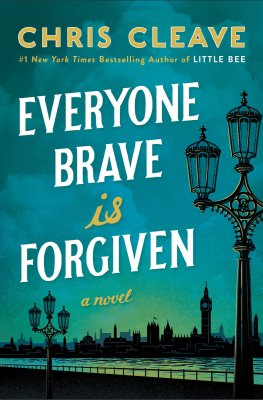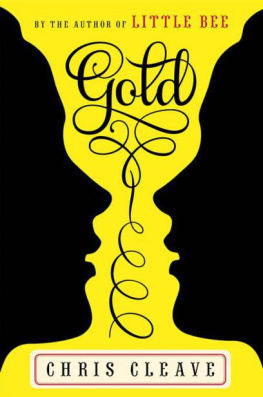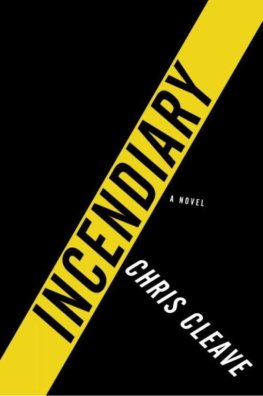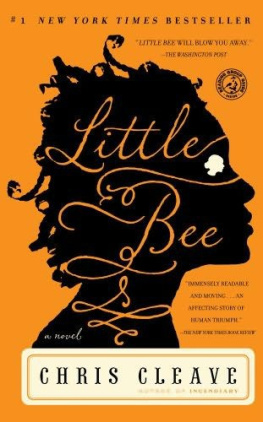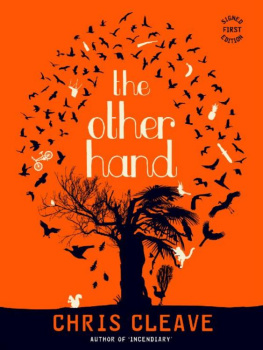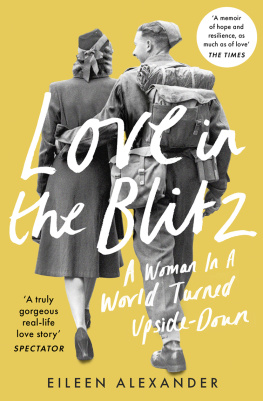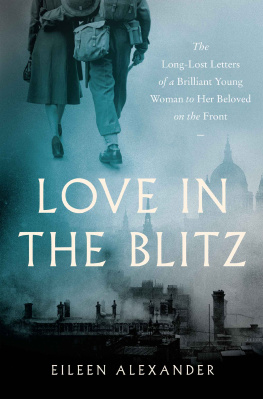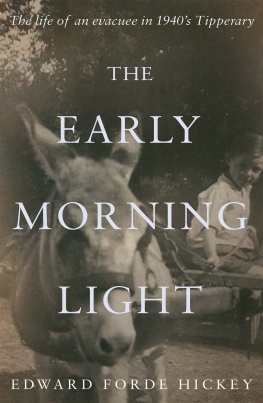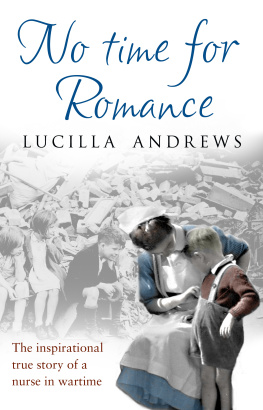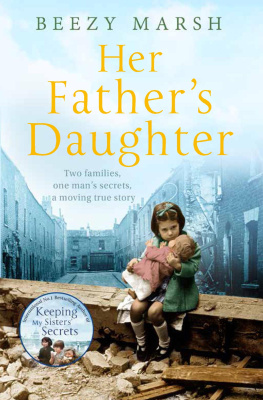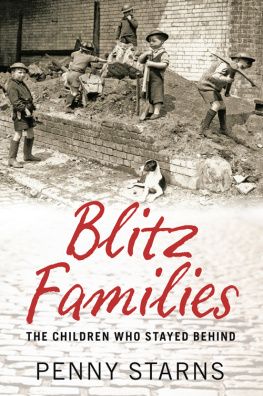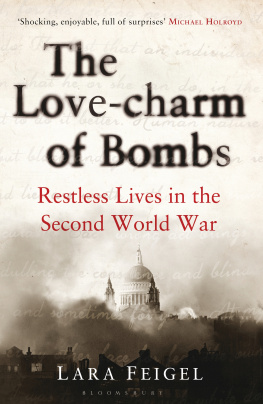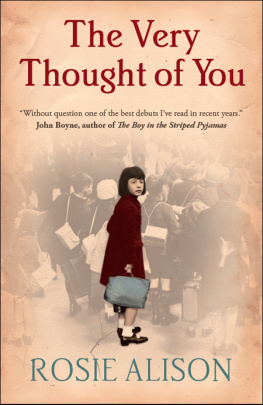Chris Cleave
Everyone Brave is Forgiven
Dear Reader:
I am thrilled to present you with an early copy of Everyone Brave is Forgiven by Chris Cleave.
In this magnificent novel, Chris has created unforgettable characters and put them in unforgiving circumstances just as he did in Little Bee.
Everyone Brave is Forgiven begins in London in 1939, at the declaration of war, when a posh young socialite named Mary impetuously volunteers. Assigned a role teaching, Mary has barely memorized her students names before theyre evacuated to the countryside. But then some children return. The deformed, the disabled, the nonwhites. Mary fills her London classroom with a handful of children who were not welcomed into the homes of their countrymen even as the bombs begin to fall.
Marys relationship with a young black American boy named Zachary and her romantic entanglements with her middle-class boss, Tom, and then with Toms debonair roommate, Alistair, who returns from the battlefront a haunted man fuel the plot of this page-turner. As the war rages on, these characters endure everyday horrors and small serendipities in equal parts.
As with any Cleave novel, as you read you will laugh and you will cry, and you will find yourself immersed in a story that feels palpably real and important. I couldnt be more excited to share this novel with you. Thank you in advance I cant wait to hear what you think.
Best,
Marysue Rucci
Vice President and Editor-in-Chief
Simon & Schuster, Inc.
1230 Avenue of the Americas
New York, NY 10020
Voice 212 698 1234 Fax 212 698 7453
marysue.rucci@simonandschuster.com
Dear Reader:
One day during the harrowing siege of Malta my maternal grandfather, Captain Hill of the Royal Artillery, was assigned to mind Randolph Churchill, the brilliant but dissipated son of the British Prime Minister. Look after him, David, said the Major General who conferred this extraordinary duty, and if at all possible keep him out of trouble.
The novel began with me wondering what that instruction meant, exactly. The Axis had maintained a two-year stranglehold on the island of Malta, reducing garrison and islanders alike to a state of advanced starvation. Into this theatre poor Randolph was parachuted, groggy and overweight. It was hot and he wanted to go swimming, so my grandfather took him to the beach the officers used, where a thin strip had been left between the mines and the barbed wire entanglements.
Randolph was visiting Malta to recruit for the fledgling SAS. The prospect on offer to the starving officers was hard to refuse: full rations and a ticket off the island, in exchange for becoming a commando. Having helped Randolph to shop this deal around, my grandfather felt it would be churlish not to volunteer himself, and was later dropped behind enemy lines in North Africa.
Randolph was known to be fantastically brave, prone to strolling through gunfire to deliver orders. On Malta he might cheerfully get himself killed or much worse captured. In the pivotal phase of World War II, the Prime Ministers son would have made a hostage of some significance. My grandfather had been issued with a good education, a Webley Mk IV revolver and a delightfully ambiguous order.
This novel, then, started out as a sort of stage play exploring the power dynamic between the two men. Yet in the end Randolph was the wrong central character. I found that I was more interested in my grandfather a man who was brave despite his handicap of finding life full of opportunities to tell funny stories and build ice yachts and read Charlie & The Chocolate Factory to his grandchildren. In the novel something of Randolph found its way into the character of Simonson, but I leave the man himself a great man in his way to his excellent biographers.
Instead I went to Malta and spent some time trying to understand my grandfathers experience. Elderly islanders were kind and answered my questions patiently and in detail I belong to the last generation of writers who can still talk to people who lived through the Second World War. I switched off my mobile phone and slept only in places where my grandfather had been billeted.
Both my grandfathers served in artillery. Wherever they were stationed one still finds the great concrete emplacements on which the guns were levelled, and the walls and crenulations that defended them. And so it was possible, when my grandfather told me that he was stationed in a certain spot on Malta, to go and find that exact place.
I spent time in the military cemeteries, too. In a memoir my grandfather had recorded in pen the names of some of the dead who were known to him, and I had typed it up. Here were those familiar names carved into stone: I traced them with my hands. The sadness of the war came over me in a way that I have heard other people speak of in relation to such places. Still, it was surprising and overwhelming.
I noticed that the cemeteries in Malta are different from Allied war graves elsewhere, in that four, five or even six men lie under each stone. I asked about it and was told with a grin to try digging a hole anywhere I liked on the island. I discovered that there is seldom more than six inches of topsoil above Maltas yellow rock. Men on starvation rations had simply done the best they could, breaking up the limestone with blunt picks. This was how I came to feel about writing the book. It would inevitably fall short of doing justice to its subject. But perhaps that is the work of a novelist after all to dig one small hole that must host a great number of men.
On my last day on the island I went to Bingemma, where my grandfather had been stationed for a while in an old Victorian fort, high on an escarpment overlooking a wide plain. I had my pad with me and I had envisaged the forts ramparts as the place where I would begin writing the novel. But I found that the fort is private property now, crumbling and fenced off with barbed wire, guarded by dogs of the species that asks questions later.
The wind made vortices of dust and carrier bags in the lee of the decaying walls. The drawbridge was blocked by fly-tipped rubble and kitchen appliances. The moat where my grandfather had raised a thin and desperate crop was overgrown and not just by scrub but by mature trees now. There were syringes on the ground. It was a forsaken and desecrated place. I didnt start the novel there after all I realized I still didnt know how to begin. Instead I picked up a small stone that had fallen from the crumbling walls and took it home for my grandfather. In the end I never gave it to him. I was worried it would sadden him to see the photos and to learn how derelict his fort had become. Probably I neednt have worried. Theres every chance he would have been tickled to learn he had outlasted the place.
My grandfather died while I was writing the novel but, as he might have remarked, it wasnt necessarily my fault. I regret that he never saw the book. I had finished the third draft of what turned out to be five, but I had decided to wait until the novel was perfect before I gave it to him to read. What a fool I am. If you will forgive the one piece of advice a writer is qualified to give: never be afraid of showing someone you love a working draft of yourself.
David Hill really did sail a fourteen-foot dinghy between floating mines, for fun, in the sparkling seas off Malta. He really did verify St. Pauls account of his shipwreck in Acts 27 by reference to the relevant Admiralty chart. He really did volunteer on the day war was declared, and for reasons that remain mysterious he really did once go absent without leave for five weeks and upon his return (for reasons equally obscure) his Colonel greeted him by glancing at his watch and asking Why are you late?

